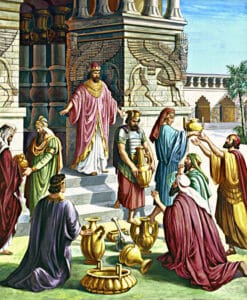Daily Lesson for Thursday 26th of June 2025
When Cyrus sacked the city of Babylon, the years of captivity for God’s people were over, and the Persians permitted the Jews to return to the Promised Land and rebuild the temple. Under Cyrus, the Persian Empire became the largest in history, with what historian Tom Holland calls “the largest agglomeration of territories that the world had ever seen.”—Dominion (New York: Basic Books, 2019), p. 25.
As was the custom among the Persians, Cyrus was even called “the Great King” or “King of kings.”
Cyrus foreshadows what will happen when Christ returns for His church: He is the King who comes from the east (compare with Matthew 24:27), waging war against Babylon, and liberating His people finally to escape from Babylon and return to the Land of Promise. (See Revelation 19:11-16.) This is why God refers to Cyrus as “His anointed” (Isaiah 45:1, NKJV); not only did this famous Persian liberate God’s people, but his campaign against Babylon is also a type of Christ’s second coming.
Read 2 Chronicles 36:22-23. In what ways does the story of Cyrus parallel that of Nebuchadnezzar? In what ways does it differ? What is the significance of the decree? After all, how did it impact the whole first coming of Jesus centuries later?
The original order of Old Testament books has been changed in our day to end with Malachi, but originally, this is where the Old Testament ended—with this declaration from Cyrus. The next episode in the canon of Scripture would be Matthew, which begins with the birth of Christ, the antitypical Cyrus. Cyrus would orchestrate the rebuilding of the earthly temple; Jesus would inaugurate His ministry in the heavenly sanctuary, leading up to His return and our liberation.
Cyrus, of course, was not a perfect representation of Christ; no type lines up perfectly with antitype, and we must be careful not to read too much into every tiny detail. Nevertheless, he broadly functions as a type of “Savior.”
|
How fascinating that God would use a pagan king in such a marked manner to do His will. Despite how things appear to us on the outside, how can we learn the truth that, long term, the Lord is going to bring about end-time events as prophesied? |
 (1)
(1)



